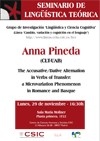Seminario de Lingüística Teórica LyCC: "The accusative / Dative alternation in verbs of transfer: a microvariation phenomenon in Romance and Basque"
Por: Anna Pineda (CLT-UAB)
Sala María Moliner 1F
The aim of this work is to account for a syntactic microvariation phenomenon found not only in Romance languages but also in Basque. It is about the alternation, in some linguistic systems, between two syntactic structures with an apparently parallel meaning. Thus, the Romance verbs expressing ‘to phone’ (in Catalan, trucar, telefonar, picar, tocar and cridar; in Spanish, llamar and telefonear; in Occitan, telefonar, sonar and apelar; in Italian, telefonare and chiamare; and in Basque deitu), apart from transitive constructions –nowadays really infrequent– in which the transmitted information is specified (1), can be inserted (depending on the dialect) in two other configurations which are distinguished by the case assigned to the argument denoting the person who receives the call, being dative (2) or accusative/absolutive (3) –even though this variation is not always recognized as standard language. The same phenomenon occurs with other Romance and Basque verbs of communication (write-type and answer-type), as well as with verbs of (des)possession (steal-type and pay-type).
Organiza: Grupo de Investigación "Lingüística y Ciencia Cognitiva"
Línea de investigación Cambio, variación y cognición en el lenguaje



